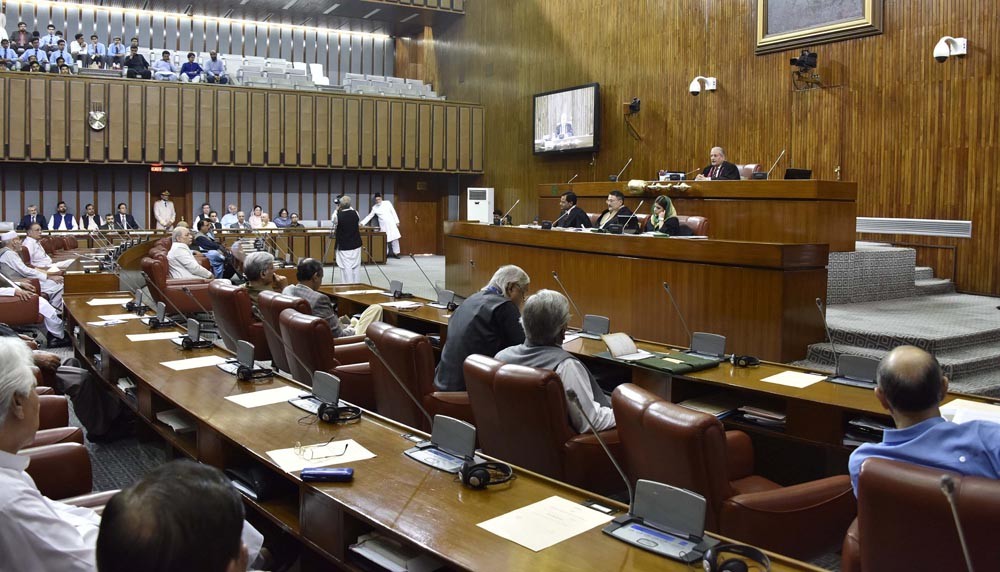
Senate has taken the lead in initiating many firsts in the country, in-camera briefing by COAS being the latest

At a time when vested interests were trying to create an atmosphere of misunderstanding and distrust between State institutions and create instability in Pakistan in cohort with inimical forces, the country’s leadership has foiled their attempts with courage and foresight, taking steps that might contribute to the strengthening of democracy.
Among these, the most noteworthy is the military leadership’s visit to the Parliament House on December 19, 2017 and in-camera briefing to the Senate Committee of the Whole on national security issues. Chief of the Army Staff, General Qamar Javed Bajwa grabbed the opportunity to also deliberate on a wide range of topics from politics to civil-military ties to anti-terrorism operations and foreign policy.
While reaffirming his commitment to democracy and supremacy of the Constitution, General Bajwa categorically denied the military’s role in destabilising the civilian government. He asked the Parliament to take the lead in framing foreign and security policies, assuring the legislators that the military was ready to back the political leadership on normalisation of ties with India. He distanced himself and his institution from the views expressed by retired generals in talk shows or their public appearances, adding those were their personal views and had nothing to do with institutional views. This augurs well for the country’s future and it is bound to go a long way in reviving the investors’ confidence in a stable Pakistan, thereby giving boost to the business, trade and commerce activities.
General Bajwa was accompanied by ISI Chief Lt. General Naveed Mukhtar, DG Military Operations Maj. General Sahir Shamshad Mirza, Military Intelligence Director General Maj. General Asim Munir and DG ISPR Maj. General Abdul Ghafoor.
Senate Rule 250 and 253 restrict disclosure of a secret briefing, but some Senators divulged details to the media, committing breach of the privilege of the House. Senate Chairman Raza Rabbani has referred the matter to the House Business Advisory Committee for probe.
Though in-camera, this timely, positive and praiseworthy interaction has been instrumental in formulating national response to challenges, established the parliament’s supremacy and put at rest the apprehensions of any unconstitutional attack on the country’s fragile democracy. It must be acknowledged that this historic and precedent-setting event could take place due to the maturity and courage of the country’s civil and military leadership. As far as its outcome is concerned, it might disappoint the self-seeking quarters who, time and again, seek unconstitutional interventions to further their ends.
Viewed in the historic context, like the COAS visit, the Upper House of the Parliament (Senate) has taken the lead in initiating many firsts in the country. Among others, these included: In-camera presentation of the country’s defence policy by the Ministry of Defence, which also presented the defence budget lines for the first time and explained the nuclear deterrence policy of the country. When the legislative bodies were restored by General Ziaul Haq, these had been functioning for some time under the rules framed by the establishment. Even at that time, the Senate earned the distinction to be the first amongst the country’s legislatures to elect the Chairmen of its standing committees which were hitherto being presided by the cabinet ministers. Not only this, the Senate of Pakistan took the lead in framing its rules of business in place of the ones framed by the bureaucracy. These steps contributed significantly to strengthening the oversight role and functions of the House.
The Army chief’s visit can be seen as a dividend earned on a past investment in the shape of a visit by the members of the Senate Defence Committee to GHQ earlier. On that occasion, the Army chief had expressed his desire for greater interaction with the Parliament and appear before the Senate Committee of the Whole to answer questions that the legislators might have.
Since its inception on August 6, 1973 following introduction of the 1973 Constitution which was adopted on April 12, 1973, the second House of Pakistan’s Parliament has played its role with distinction and has always come up to the expectations of the people.
The main purpose for the creation of the Senate was to give equal representation to all federating units since the membership of the National Assembly was determined on the basis of population. As a legislative body, the Senate provides equal representation to all four federating units, regardless of their size and population.
As a permanent legislative institution, which symbolises a process of continuity in national affairs, the Senate has played its parliamentary role quite successfully, in particular offering those belonging to the smaller provinces a sense of security as the custodian of their rights. Under the constitutional arrangement, particularly the existence of a bicameral Legislature, it is not possible for any unit of the federation to trample upon the rights of other units merely on the basis of its numerical strength in the National Assembly.